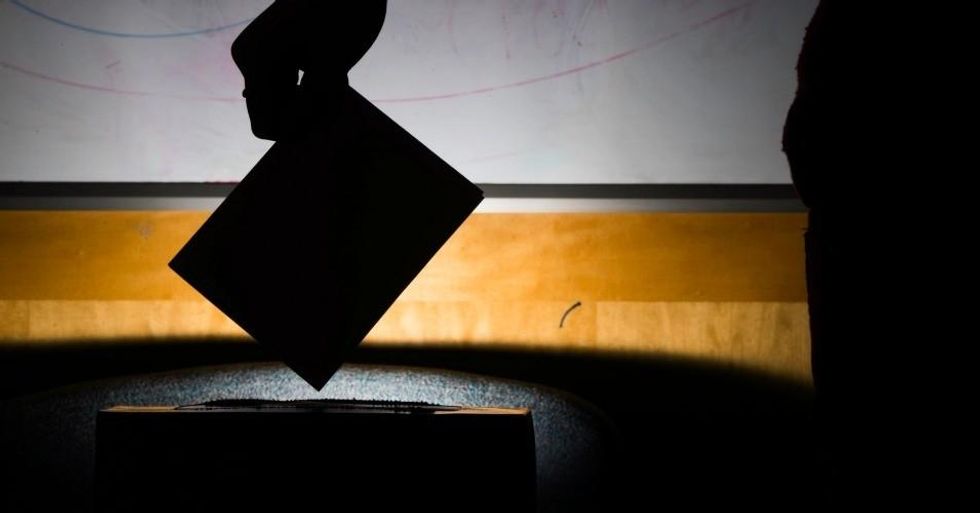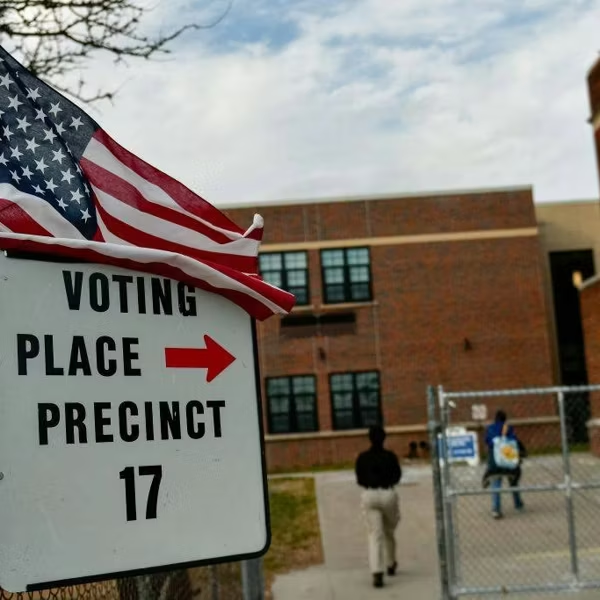'Rigged' 2016 Election Has Voters Feeling Helpless, Unheard, and Ashamed
A new poll found that 90 percent of voters lack confidence in the country's political system

This year's presidential primary has left many voters feeling helpless and alienated from their political parties, according to a new poll, which found that Democrats and Republicans alike want to see major changes in the way presidential candidates are chosen.
The survey, conducted by the Associated Press-NORC Center for Public Affairs Research and published Tuesday, reported that a full 90 percent of voters lack confidence in the country's political system while 40 percent went so far as to say that the two-party structure is "seriously broken."
Seventy percent of voters, including equal proportions of Democrats and Republicans, said they feel frustrated about the 2016 presidential election and 55 percent reported feeling "helpless."
The survey, which was conducted May 12-15, comes as voters on both sides of the aisle have expressed historic dislike for the two leading candidates, GOP nominee Donald Trump and Democratic frontrunner Hillary Clinton.
The issue of superdelegates--elected officials and Democratic elites--has gotten a lot of attention this year because of the overwhelming number that, even before the primaries began, backed party favorite Clinton over challenger Bernie Sanders. According to AP's numbers, Clinton has won just 274 more pledged delegates than Sanders, but boasts having the support of 525 superdelegates to his 39.
According to the survey, 53 percent of voters say that the Democrats' use of superdelegates is a "bad idea" while just 17 percent support the system.
Moreover, 70 percent of voters said they prefer that primaries and caucuses would be open to all voters, rather than "closed" to all but registered party members.
"It's kind of like a rigged election," Nayef Jaber, a 66-year-old Sanders supporter from San Rafael, California, told AP. "It's supposed to be one man one vote. This is the way it should be."
Most Americans believe that neither political party represents the views of ordinary voters. Just 14 percent say the Democratic Party is responsive to the opinions of the average voter while 8 percent say the same about the Republicans.
Similarly, voters said that neither party is receptive to fresh perspectives. "Only 17 percent of the public say the Democratic Party is open to new ideas about dealing with the country's problems; 10 percent say that about the Republican Party," the survey reports.
And despite arguments that Sanders' refusal to step down has hurt Clinton's chances in the general election, 64 percent of Democrats say his bid for the nomination has been good for the party, along with 43 percent of Republicans.
Overall, the survey found that while the 2016 election has captured the public's interest, "only 37 percent are feeling hopeful about the campaign, 23 percent are excited, and just 13 percent say the presidential election make them feel proud."
An Urgent Message From Our Co-Founder
Dear Common Dreams reader, The U.S. is on a fast track to authoritarianism like nothing I've ever seen. Meanwhile, corporate news outlets are utterly capitulating to Trump, twisting their coverage to avoid drawing his ire while lining up to stuff cash in his pockets. That's why I believe that Common Dreams is doing the best and most consequential reporting that we've ever done. Our small but mighty team is a progressive reporting powerhouse, covering the news every day that the corporate media never will. Our mission has always been simple: To inform. To inspire. And to ignite change for the common good. Now here's the key piece that I want all our readers to understand: None of this would be possible without your financial support. That's not just some fundraising cliche. It's the absolute and literal truth. We don't accept corporate advertising and never will. We don't have a paywall because we don't think people should be blocked from critical news based on their ability to pay. Everything we do is funded by the donations of readers like you. Will you donate now to help power the nonprofit, independent reporting of Common Dreams? Thank you for being a vital member of our community. Together, we can keep independent journalism alive when it’s needed most. - Craig Brown, Co-founder |

This year's presidential primary has left many voters feeling helpless and alienated from their political parties, according to a new poll, which found that Democrats and Republicans alike want to see major changes in the way presidential candidates are chosen.
The survey, conducted by the Associated Press-NORC Center for Public Affairs Research and published Tuesday, reported that a full 90 percent of voters lack confidence in the country's political system while 40 percent went so far as to say that the two-party structure is "seriously broken."
Seventy percent of voters, including equal proportions of Democrats and Republicans, said they feel frustrated about the 2016 presidential election and 55 percent reported feeling "helpless."
The survey, which was conducted May 12-15, comes as voters on both sides of the aisle have expressed historic dislike for the two leading candidates, GOP nominee Donald Trump and Democratic frontrunner Hillary Clinton.
The issue of superdelegates--elected officials and Democratic elites--has gotten a lot of attention this year because of the overwhelming number that, even before the primaries began, backed party favorite Clinton over challenger Bernie Sanders. According to AP's numbers, Clinton has won just 274 more pledged delegates than Sanders, but boasts having the support of 525 superdelegates to his 39.
According to the survey, 53 percent of voters say that the Democrats' use of superdelegates is a "bad idea" while just 17 percent support the system.
Moreover, 70 percent of voters said they prefer that primaries and caucuses would be open to all voters, rather than "closed" to all but registered party members.
"It's kind of like a rigged election," Nayef Jaber, a 66-year-old Sanders supporter from San Rafael, California, told AP. "It's supposed to be one man one vote. This is the way it should be."
Most Americans believe that neither political party represents the views of ordinary voters. Just 14 percent say the Democratic Party is responsive to the opinions of the average voter while 8 percent say the same about the Republicans.
Similarly, voters said that neither party is receptive to fresh perspectives. "Only 17 percent of the public say the Democratic Party is open to new ideas about dealing with the country's problems; 10 percent say that about the Republican Party," the survey reports.
And despite arguments that Sanders' refusal to step down has hurt Clinton's chances in the general election, 64 percent of Democrats say his bid for the nomination has been good for the party, along with 43 percent of Republicans.
Overall, the survey found that while the 2016 election has captured the public's interest, "only 37 percent are feeling hopeful about the campaign, 23 percent are excited, and just 13 percent say the presidential election make them feel proud."

This year's presidential primary has left many voters feeling helpless and alienated from their political parties, according to a new poll, which found that Democrats and Republicans alike want to see major changes in the way presidential candidates are chosen.
The survey, conducted by the Associated Press-NORC Center for Public Affairs Research and published Tuesday, reported that a full 90 percent of voters lack confidence in the country's political system while 40 percent went so far as to say that the two-party structure is "seriously broken."
Seventy percent of voters, including equal proportions of Democrats and Republicans, said they feel frustrated about the 2016 presidential election and 55 percent reported feeling "helpless."
The survey, which was conducted May 12-15, comes as voters on both sides of the aisle have expressed historic dislike for the two leading candidates, GOP nominee Donald Trump and Democratic frontrunner Hillary Clinton.
The issue of superdelegates--elected officials and Democratic elites--has gotten a lot of attention this year because of the overwhelming number that, even before the primaries began, backed party favorite Clinton over challenger Bernie Sanders. According to AP's numbers, Clinton has won just 274 more pledged delegates than Sanders, but boasts having the support of 525 superdelegates to his 39.
According to the survey, 53 percent of voters say that the Democrats' use of superdelegates is a "bad idea" while just 17 percent support the system.
Moreover, 70 percent of voters said they prefer that primaries and caucuses would be open to all voters, rather than "closed" to all but registered party members.
"It's kind of like a rigged election," Nayef Jaber, a 66-year-old Sanders supporter from San Rafael, California, told AP. "It's supposed to be one man one vote. This is the way it should be."
Most Americans believe that neither political party represents the views of ordinary voters. Just 14 percent say the Democratic Party is responsive to the opinions of the average voter while 8 percent say the same about the Republicans.
Similarly, voters said that neither party is receptive to fresh perspectives. "Only 17 percent of the public say the Democratic Party is open to new ideas about dealing with the country's problems; 10 percent say that about the Republican Party," the survey reports.
And despite arguments that Sanders' refusal to step down has hurt Clinton's chances in the general election, 64 percent of Democrats say his bid for the nomination has been good for the party, along with 43 percent of Republicans.
Overall, the survey found that while the 2016 election has captured the public's interest, "only 37 percent are feeling hopeful about the campaign, 23 percent are excited, and just 13 percent say the presidential election make them feel proud."

